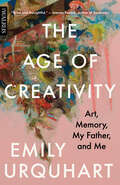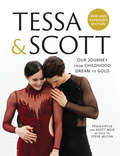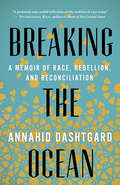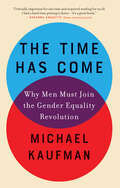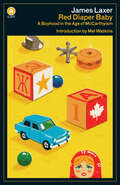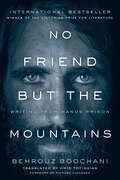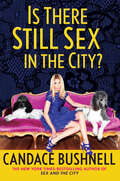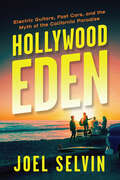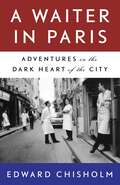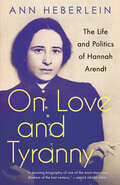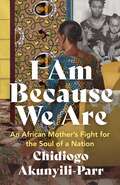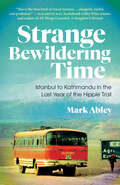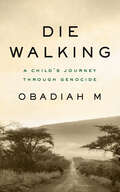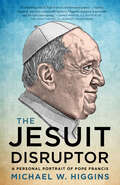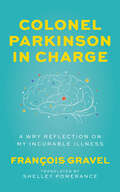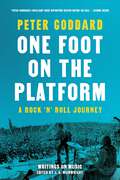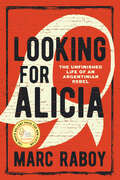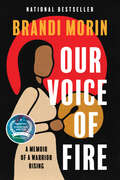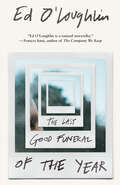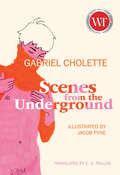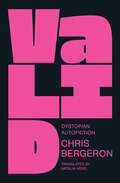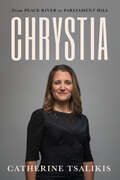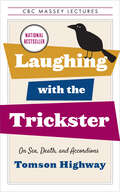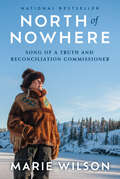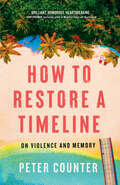- Table View
- List View
The Age of Creativity: Art, Memory, My Father, and Me
by Emily UrquhartA moving portrait of a father and daughter relationship and a case for late-stage creativity from Emily Urquhart, the bestselling author of Beyond the Pale: Folklore, Family, and the Mystery of Our Hidden Genes. “The fundamental misunderstanding of our time is that we belong to one age group or another. We all grow old. There is no us and them. There was only ever an us.” — from The Age of CreativityIt has long been thought that artistic output declines in old age. When Emily Urquhart and her family celebrated the eightieth birthday of her father, the illustrious painter Tony Urquhart, she found it remarkable that, although his pace had slowed, he was continuing his daily art practice of drawing, painting, and constructing large-scale sculptures, and was even innovating his style. Was he defying the odds, or is it possible that some assumptions about the elderly are flat-out wrong? After all, many well-known visual artists completed their best work in the last decade of their lives, Turner, Monet, and Cézanne among them. With the eye of a memoirist and the curiosity of a journalist, Urquhart began an investigation into late-stage creativity, asking: Is it possible that our best work is ahead of us? Is there an expiry date on creativity? Do we ever really know when we’ve done anything for the last time?The Age of Creativity is a graceful, intimate blend of research on ageing and creativity, including on progressive senior-led organizations, such as a home for elderly theatre performers and a gallery in New York City that only represents artists over sixty, and her experiences living and travelling with her father. Emily Urquhart reveals how creative work, both amateur and professional, sustains people in the third act of their lives, and tells a new story about the possibilities of elder-hood.
Tessa and Scott: Our Journey from Childhood Dream to Gold
by Tessa Virtue Scott MoirTessa and Scott share their incredible and inspiring story — now updated and expanded with a new introduction, over 100 dazzling new photographs, and three all-new chapters covering the pair’s stunning performances at the Sochi and PyeongChang Olympic Games and beyond.Tessa Virtue and Scott Moir are the most decorated figure skaters in the history of the sport, and are widely celebrated by peers and fans alike for their superior athleticism, one-of-a-kind partnership, and generosity of spirit. In these pages, they share their incredible story with the world. Tessa and Scott: Our Journey from Childhood Dream to Gold offers an intimate and revealing behind-the-scenes look at the iconic duo. Veteran sports columnist Steve Milton draws from hours of conversations with Tessa and Scott as they take us from their first meeting in 1995 to their impressive debut and rapid rise on the international scene; from the highs and lows of competitive skating to the profound impact of Tessa’s injury and subsequent recovery; and from their unprecedented Olympic achievements in Vancouver in 2010 and Sochi in 2014, through to their exhilarating triumph in Pyeongchang in 2018, when their performance capture hearts the world over and catapulted them into unparalleled international acclaim. Lavishly illustrated with over 100 new photos, this updated and expanded edition is filled with personal stories and recollections from Tessa, Scott, and those close to them — including family members, friends, and coaches past and present. Tessa and Scott is as much a spectacular visual history as it is a celebration of two of the world’s premier athletes.
Breaking the Ocean: A Memoir of Race, Rebellion, and Reconciliation
by Annahid DashtgardIn Breaking the Ocean, diversity and inclusion specialist Annahid Dashtgard addresses the long-term impacts of exile, immigration, and racism by offering a vulnerable, deeply personal account of her life and work.Annahid Dashtgard was born into a supportive mixed-race family in 1970s Iran. Then came the 1979 Revolution, which ushered in a powerful and orthodox religious regime. Her family was forced to flee their homeland, immigrating to a small town in Alberta, Canada. As a young girl, Dashtgard was bullied, shunned, and ostracized both by her peers at school and adults in the community. Home offered little respite, with her parents embroiled in their own struggles, exposing the sharp contrasts between her British mother and Persian father.Determined to break free from her past, Dashtgard created a new identity for herself as a driven young woman who found strength through political activism, eventually becoming a leader in the anti–corporate globalization movement of the late 1990s. But her unhealed trauma was re-activated following the 9/11 terrorist attacks. Suffering burnout, Dashtgard checked out of her life and took the first steps towards personal healing, a journey that continues to this day.Breaking the Ocean introduces a unique perspective on how racism and systemic discrimination result in emotional scarring and ongoing PTSD. It is a wake-up call to acknowledge our differences, addressing the universal questions of what it means to belong and ultimately what is required to create change in ourselves and in society.
The Time Has Come: Why Men Must Join the Gender Equality Revolution
by Michael KaufmanIn the vein of Tim Wise’s White Like Me and Sheryl Sandberg’s Lean In, The Time Has Come —by co-founder of the White Ribbon campaign Michael Kaufman — offers a plain-spoken and forthright look at why and how men must actively fight for gender equality.From founding the White Ribbon Campaign, the world’s largest organized effort of men working to end violence against women, in the early 1990s, to his appointment as the only male member of the G7 Gender Equality Advisory Council, Michael Kaufman has been a major figure in promoting social justice and women’s rights for decades. Now, in The Time Has Come, he issues a stirring call for men to mobilize in the movement for gender equality.Weaving together sociological data, personal experiences, and insights gleaned from decades of work with governments and NGOs around the globe, Kaufman explores topics ranging from domestic violence to parental leave, grappling with the ways in which a culture of toxic masculinity hurts women and men (and their children). Informative and provocative, The Time Has Come demonstrates how real gender equality creates advancements in both the workplace and the global economy, and urges men to become dedicated allies in dismantling the patriarchy.
Red Diaper Baby: A Boyhood in the Age of McCarthyism (A List)
by James LaxerThe remarkable memoir of growing up in a communist family at the height of the Cold War, by the late historian, public intellectual, and political activist, James Laxer. Originally published in 2004, Red Diaper Baby is James Laxer’s extraordinary memoir of growing up in a communist family during the height of the Cold War. When Jim was born his father was in hiding under an assumed name. When it came time to begin school, Jim was enrolled under a false birth date. Throughout his childhood he was repeatedly instructed to tell noone what his father did for work.Laxer’s parents were members of the Communist Party, true believers in an ideology generally reviled and outlawed during much of World War II. From an early age, Laxer was collecting signatures on ban-the-bomb petitions, delivering Party flyers door to door, attending eccentric left-wing Camp Naivelt, and campaigning for the charismatic J. B. Salsberg, a Communist MPP in the Ontario legislature.Dramatic, humorous, and full of period detail, Red Diaper Baby offers a rare look at the McCarthy years through the eyes of a child. It also explains a great deal about Laxer’’s crucial role in the founding of the Waffle faction of the NDP, his continued engagement with the left, and his evolution into one of Canada’’s preeminent intellectuals.
No Friend but the Mountains: Writing from Manus Prison
by Behrouz BoochaniWinner of Australia’s richest literary award, No Friend but the Mountains is Kurdish-Iranian journalist and refugee Behrouz Boochani’s account of his detainment on Australia’s notorious Manus Island prison. Composed entirely by text message, this work represents the harrowing experience of stateless and imprisoned refugees and migrants around the world.In 2013, Kurdish-Iranian journalist Behrouz Boochani was illegally detained on Manus Island, a refugee detention centre off the coast of Australia. He has been there ever since. This book is the result. Laboriously tapped out on a mobile phone and translated from the Farsi. It is a voice of witness, an act of survival. A lyric first-hand account. A cry of resistance. A vivid portrait of five years of incarceration and exile. Winner of the Victorian Prize for Literature, No Friend but the Mountains is an extraordinary account — one that is disturbingly representative of the experience of the many stateless and imprisoned refugees and migrants around the world.“Our government jailed his body, but his soul remained that of a free man.” — From the Foreword by Man Booker Prize–winning author Richard Flanagan
Is There Still Sex in the City?
by Candace BushnellTwenty years after her sharp, seminal first book Sex and the City reshaped the landscape of pop culture and dating with its fly-on-the-wall look at the mating rituals of the Manhattan elite, the trailblazing Candace Bushnell delivers a new book on the highs and lows of sex and dating after fifty.Set between the Upper East Side of Manhattan and a country enclave known as The Village, Is There Still Sex in the City? gathers Bushnell’s signature short, sharp, satirical commentaries on the love and dating habits of middle-aged men and women as they continue to navigate the ever-modernizing world of relationships. Throughout, Bushnell documents twenty-first century dating phenomena, such as the “Unintended Cub Situation” in which a sensible older woman suddenly becomes the love interest of a much younger man, the “Mona Lisa” Treatment — a vaginal restorative surgery often recommended to middle-aged women — and what it’s really like to go on Tinder dates as a fifty-something divorcée. Bushnell also updates one of her most celebrated stories from Sex and the City, about “Bicycle Boys,” a breed of New York man who is always trying to bring his bike up to women’s apartments. Once an anomaly, Bushnell charts their new ubiquitousness, in addition to where, and how, to do your own man stalking via bicycle (and whether or not it’s worth it).
Hollywood Eden: Electric Guitars, Fast Cars, and the Myth of the California Paradise
by Joel Selvin“Hollywood Eden brings the lost humanity of the record business vividly back to life … [Selvin’s] style is blunt, unpretentious and brisk; he knows how to move things along entertainingly … Songs about surfboards and convertibles had turned quaint, but in this book, their coolness is restored.” — New York Times From surf music to hot-rod records to the sunny pop of the Beach Boys, Jan & Dean, the Byrds, and the Mama’s & the Papa’s, Hollywood Eden captures the fresh blossom of a young generation who came together in the epic spring of the 1960s to invent the myth of the California Paradise. Central to the story is a group of sun-kissed teens from the University High School class of 1959 — a class that included Jan & Dean, Nancy Sinatra, and future members of the Beach Boys — who came of age in Los Angeles at the dawn of a new golden era when anything seemed possible. These were the people who invented the idea of modern California for the rest of the world. But their own private struggles belied the paradise portrayed in their music. What began as a light-hearted frolic under sunny skies ended up crashing down to earth just a few short but action-packed years later as, one by one, each met their destinies head-on. A rock ’n’ roll opera loaded with violence, deceit, intrigue, low comedy, and high drama, Hollywood Eden tells the story of a group of young artists and musicians who bumped heads, crashed cars, and ultimately flew too close to the sun.
A Waiter in Paris: Adventures in the Dark Heart of the City
by Edward ChisholmInspired by George Orwell’s Down and Out in Paris and London, A Waiter in Paris is a brilliant portrait of the underbelly of contemporary Paris through the eyes of a young waiter scraping out a living in the City of Light. A waiter’s job is to deceive you. They want you to believe in a luxurious calm because on the other side of that door … is hell. Edward Chisholm’s spellbinding memoir of his time as a Parisian waiter takes you below the surface of one of the most iconic cities in the world and right into its glorious underbelly. There, Chisholm inhabits a world of inhuman hours, snatched sleep, and dive bars. He scrapes by on coffee, bread, and cigarettes, often working under sadistic managers, for a wage so low he’s forced to fight his colleagues for tips. And these colleagues — thieves, narcissists, ex-Legionnaires, paperless immigrants, wannabe actors, and drug dealers — are the closest thing he has to family. Waiting tables is physically demanding work, frequently humiliating, and incredibly competitive. But it doesn’t matter because you’re in Paris, the centre of the universe, and there’s nowhere else you’d rather be in the world.
On Love and Tyranny: The Life and Politics of Hannah Arendt
by Dr. Ann HeberleinIn an utterly unique approach to biography, On Love and Tyranny traces the life and work of the iconic German Jewish intellectual Hannah Arendt, whose political philosophy and understandings of evil, totalitarianism, love, and exile prove essential amid the rise of the refugee crisis and authoritarian regimes around the world. What can we learn from the iconic political thinker Hannah Arendt? Well, the short answer may be: to love the world so much that we think change is possible.The life of Hannah Arendt spans a crucial chapter in the history of the Western world, a period that witnessed the rise of the Nazi regime and the crises of the Cold War, a time when our ideas about humanity and its value, its guilt and responsibility, were formulated. Arendt’s thinking is intimately entwined with her life and the concrete experiences she drew from her encounters with evil, but also from love, exile, statelessness, and longing. This strikingly original work moves from political themes that wholly consume us today, such as the ways in which democracies can so easily become totalitarian states; to the deeply personal, in intimate recollections of Arendt’s famous lovers and friends, including Heidegger, Benjamin, de Beauvoir, and Sartre; and to wider moral deconstructions of what it means to be human and what it means to be humane.On Love and Tyranny brings to life a Hannah Arendt for our days, a timeless intellectual whose investigations into the nature of evil and of love are eerily and urgently relevant half a century later.
I Am Because We Are: An African Mother’s Fight for the Soul of a Nation
by Chidiogo Akunyili-ParrIn this innovative and intimate memoir, a daughter tells the story of her mother, a pan-African hero who faced down misogyny and battled corruption in Nigeria. Inspired by the African philosophy of Ubuntu — the importance of community over the individual — and outraged by injustice, Dora Akunyili took on fraudulent drug manufacturers whose products killed millions, including her sister. A woman in a man’s world, she was elected and became a cabinet minister, but she had to deal with political manoeuvrings, death threats, and an assassination attempt for defending the voiceless. She suffered for it, as did her marriage and six children. I Am Because We Are illuminates the role of kinship, family, and the individual’s place in society, while revealing a life of courage, how community shaped it, and the web of humanity that binds us all.
Strange Bewildering Time: Istanbul to Kathmandu in the Last Year of the Hippie Trail
by Mark AbleyA poet and journalist looks back on a remarkable journey from Turkey to Nepal in 1978, when the region was on the brink of massive transformation. In the spring of 1978, at age twenty-two, Mark Abley put aside his studies at Oxford and set off with a friend on a three-month trek across the celebrated Hippie Trail — a sprawling route between Europe and South Asia, peppered with Western bohemians and vagabonds. It was a time when the Shah of Iran still reigned supreme, Afghanistan lay at peace, and city streets from Turkey to India teemed with unrest. Within a year, many of the places he visited would become inaccessible to foreign travellers. Drawing from the tattered notebooks he filled as a youthful wanderer, Abley brings his kaleidoscope of experiences back to life with vivid detail: dancing in a Turkish disco, clambering across a glacier in Kashmir, travelling by train among Baluchi tribesmen who smuggled kitchen appliances over international borders. He also reflects on the impact of the Hippie Trail and the illusions of those who journeyed along it. The lively immediacy of Abley’s journals combined with the measured wisdom of his mature, contemporary voice provides rich insight, bringing vibrant witness and historical perspective to this beautifully written portrait of a region during a time of irrevocable change.
Die Walking: A Child's Journey Through Genocide
by Obadiah M.An unforgettable first-person account of surviving the Rwandan genocide and its aftermath In 1994, Obadiah was the thirteen-year-old son of a Hutu pastor in Rwanda, dreaming of becoming a pilot, when he heard something was wrong in the capital. He didn’t understand the politics, but an uncle appeared, a family meeting was held, and then they were fleeing genocide with soldiers in pursuit. Everywhere was death, hunger, that smell. Stalked by terror, Obadiah kept moving through unrelenting danger and the darkest despair. He was sustained by faith and the philosophy of ubuntu — finding one’s self through connection with others. But not even escape led to safety, as Obadiah had to ultimately face the horrors of the American refugee detention system. In the spirit of Night by Elie Wiesel, Die Walking is one boy’s horrific story of shared humanity in a chaotic world.
The Jesuit Disruptor: A Personal Portrait of Pope Francis
by Michael W. HigginsA fresh look at a complex pope with a simple agenda: radically reforming the Catholic Church. Jorge Mario Bergoglio is the consummate disruptor, disrupting archaic modes of church governance, disrupting our collective spiritual complacency in the face of new challenges to our human flourishing while at the same time remaining deeply faithful to the organic traditions of the church. He is the leader of the Roman Catholic Church, but beyond that he is a universal leader with commanding moral presence, able to connect with laypeople and with non-Christian faiths. Pope Francis is also a credible moral voice on issues of immigration, economic inequity, the devastating consequences of political populism, and the accelerating threats to the environment, in spite of the fact that he faces deep infrastructure and governance scandals in his organization. In his determination to reform the Vatican and ensure the Catholic faith evolves in a way that is relevant to the 21st century, Francis is very much carrying on the tradition of the Jesuits, an order known for their work in education, humanitarian missions, and social justice. A deep understanding of the Jesuit order informs Michael W. Higgins’s approach in this novel reading of a papacy unlike any other.
Colonel Parkinson in Charge: A Wry Reflection on My Incurable Illness
by François GravelA writer’s witty and surprisingly optimistic account of learning to live with Parkinson’s disease. When he was sixty-five, François Gravel was diagnosed with Parkinson’s disease, upending the old age he had imagined for himself. As a way of contemplating his new life with a degenerative illness, he turned to what he knew best and loved most: writing. Gravel immersed himself in research on Parkinson’s, exploring its medical history and treatments and paying close attention to the changes he experienced, all in service of learning how to best manage his symptoms throughout the advancement of this incurable disease. With a lightness of touch that belies a difficult subject (he imagines Dr. Parkinson as a military man who has set up camp in his brain), Gravel shares what he has learned in a memoir that is at once charming, serious, and moving. He writes, “For a long time, I believed that Parkinson’s was a disease. Now, I realize it’s a philosophy course.” Colonel Parkinson in Charge is, in some ways, the companion text for this course, engaging with and demystifying a daunting subject to help readers better understand life with Parkinson’s disease.
One Foot on the Platform: A Rock 'N' Roll Journey
by Peter GoddardThe final word from one of popular music's greatest critics. In the summer of 2020, acclaimed music critic and journalist Peter Goddard began work on a new book that would take readers on a journey back through his fifty-plus years spent writing professionally about rock music and the musical styles circling it—everything from blues and jazz to country and classical. His plan was to revisit his old haunts and their habitués, scenes and figures he first wrote about starting in the mid-1960s when he became Canada’s first on-staff popular music critic, to show how ongoing revisions continually reframe first impressions. Tragically, Goddard died in 2022 before work on the manuscript was complete. But many of the core essays—on Bob Dylan, John Lennon and Yoko Ono, the Who, k.d. lang, David Bowie, Liza Minelli, The Band, Neil Diamond, and others—are here. Accompanying these new essays is a collection of some of the best writing of Goddard’s career—ranging from interviews with B. B. King, Joni Mitchell, Paul Simon, Bruce Springsteen, and Janis Joplin to reviews of classic albums by the Beatles, the Rolling Stones, and Neil Young, to close readings of Leonard Cohen, Anne Murray, Led Zeppelin, and Gordon Lightfoot. Taken as a whole, One Foot on the Platform represents more than fifty years of thought and writing by one of Canada’s foremost cultural critics.
Looking for Alicia: The Unfinished Life of an Argentinian Rebel
by Marc RaboyThe biography of a radical young idealist, her determination to make a difference in the world, and her disappearance in 1976, revealing the human cost and undying legacy of Argentina’s descent into rightwing madness. It started with a coincidence — when Marc Raboy happened to discover that he shared a surname with a young left-wing Argentinian journalist who in 1976 was ambushed by a right-wing death squad while driving with her family. Alicia’s partner was killed on the spot, and their baby daughter was taken and placed in an orphanage. The child was ultimately rescued, but Alicia was never heard from again. In Looking for Alicia, Raboy pursues her story not only to learn what happened when the post-Perón government in Argentina turned to state terror but also to understand the lives of those who risked everything to oppose it. Author and subject share more than a surname and a distant ancestral connection; their lives were both marked by youthful rebellion, journalistic ambition, and the radical politics that were a hallmark of the ’60s and ’70s. Raboy reassembles Alicia’s story using family archives, interviews with those who knew her, secret diplomatic correspondence recently made public by the U.S. State Department, and transcripts from the trial of former Argentine security forces personnel involved in her disappearance. Examining Alicia’s and his own different choices and circumstances, he attempts to discover how their lives diverged — and what drives people like Alicia to face death in the pursuit of their ideals.
Our Voice of Fire: A Memoir of a Warrior Rising
by Brandi MorinA wildfire of a debut memoir by internationally recognized French/Cree/Iroquois journalist Brandi Morin set to transform the narrative around Indigenous Peoples. Brandi Morin is known for her clear-eyed and empathetic reporting on Indigenous oppression in North America. She is also a survivor of the Missing and Murdered Indigenous Women and Girls crisis and uses her experience to tell the stories of those who did not survive the rampant violence. From her time as a foster kid and runaway who fell victim to predatory men and an oppressive system to her career as an internationally acclaimed journalist, Our Voice of Fire chronicles Morin’s journey to overcome enormous adversity and find her purpose, and her power, through journalism. This compelling, honest book is full of self-compassion and the purifying fire of a pursuit for justice.
The Last Good Funeral of the Year
by Ed O’LoughlinFrom Ed O’Loughlin, author of Scotiabank Giller Prize finalist Minds of Winter, a pensive and poignant recollection of love, loss, marriage, and the life events that have shaped his identity. Soon, the lockdown would start. People would die alone, without any proper ceremony. Charlotte’s death would be washed away, the first drop in a downpour. Nobody knew it then, but hers would be the last good funeral of the year. It was February 2020 when Ed O’Loughlin unexpectedly heard that Charlotte, a friend from the old days, had just died young and before her time. He realized that he was being led to reappraise his life, his family, and his career as a foreign correspondent and novelist in a new, colder light. This search for meaning becomes the driving theme of O’Loughlin’s year of confinement. The result is a haunting examination of the author’s early life and love, the journalists and photographers with whom he covered wars in Africa and the Middle East, the suicide of his brother, his new work as an author, a family home on the edge of a graveyard, and the mysteries of memory, aging, and loss. He was suddenly faced with facts that he had been ignoring, that he was getting old, that he wasn’t what he used to be, that his imagination, always over-active, had at some point reversed its direction, switching production from dreams to regrets. Moving, funny, and searingly honest, The Last Good Funeral of the Year takes the reader on a circular journey from present to past and back to the present: “Could any true story end any other way?”
Scenes from the Underground
by Gabriel CholetteI have just heard for the first time the expression “to make soup”: it means to mix the bottom-of-the-pocket drugs of everyone huddled in the club toilet stall, opened MD, ketamine, old dry speed, crushed e pills, to make big lines that will let us forget the past forty-eight hours that have been so difficult. In Instagram-style vignettes that span Montreal, New York, and Berlin, our narrator — a doctoral student in medieval studies — leads us through the bathrooms and back rooms of clubs and raves as he explores the sex, drugs, and music that define queer nightlife. Accompanied by Jacob Pyne’s full-colour illustrations, which perfectly punctuate the narrator’s occasional self-destructive melancholy, Scenes from the Underground delivers the fully uninhibited field notes of the club scene.
Valid: Dystopian Autofiction
by Chris BergeronA genre-bending speculative look at a dark future, Valid shares the story of one trans woman leading a revolution. This is a mutiny. If our mutiny is to succeed, I must name things well, without diversion. Lacking this, you will not deviate from your certainties. Here it is: I am trans. As in transgression. I have broken genres. I have removed myself from the rules. I am trans. As in translation. I have dragged the elements that make up my person from one state to another. My geometry is variable. And tonight, I am a revolution. /warning: code red… fetch-query protocol enabled… transmission failed… standby/ Set in a disturbingly transfigured Montreal in the year 2050, Valid is a monologue delivered over the span of eight hours by Christelle, a seventy-year-old trans woman forced to live as a man in order to survive. Speaking to her captor, an ever–more powerful AI, she turns the tables and mounts her own revolution by showing her truest self. Part autofiction, part dystopic speculation on an all-too-possible future characterized by corporate power, ecological collapse, and political havoc, Valid is an ambitious work that is as much philosophical as it is confessional.
Chrystia: From Peace River to Parliament Hill
by Catherine TsalikisThe intriguing, in-depth story of the most powerful woman in Canadian politics. Catherine Tsalikis traces Chrystia Freeland’s remarkable journey from the northwestern Alberta town of Peace River to Moscow, London, and New York, where she spent two decades as a journalist, to the halls of Parliament Hill as deputy prime minister and finance minister in Justin Trudeau’s Liberal government. Ambitious and talented with a work ethic to match, Freeland has had an impressive run since she entered politics in 2013: spearheading major trade negotiations, expertly navigating relations with an erratic US president, speaking out about human rights abuses in Saudi Arabia, and standing up to Vladimir Putin’s aggressions in Ukraine. With her impeccable research, seasoned perspective, and accessible style, Tsalikis brings Freeland’s story to life. The defining moments and experiences that shaped Freeland’s particular worldview illuminate the answers to larger social questions: how to live a good, useful life; how to hold fast to guiding principles; how to break through glass ceilings. This is a unique behind-the-curtains look at Canadian politics through the story of a trailblazing woman.
Laughing with the Trickster: On Sex, Death, and Accordions (The CBC Massey Lectures)
by Tomson HighwayBrilliant, jubilant insights into the glory and anguish of life from one of the world’s most treasured Indigenous creators. Trickster is zany, ridiculous. The ultimate, over-the-top, madcap fool. Here to remind us that the reason for existence is to have a blast and to laugh ourselves silly. Celebrated author and playwright Tomson Highway brings his signature irreverence to an exploration of five themes central to the human condition: language, creation, sex and gender, humour, and death. A comparative analysis of Christian, classical, and Cree mythologies reveals their contributions to Western thought, life, and culture—and how North American Indigenous mythologies provide unique, timeless solutions to our modern problems. Highway also offers generous personal anecdotes, including accounts of his beloved accordion-playing, caribou-hunting father, and plentiful Trickster stories as curatives for the all-out unhappiness caused by today’s patriarchal, colonial systems. Laugh with the legendary Tomson Highway as he illuminates a healing, hilarious way forward.
North of Nowhere: Song of a Truth and Reconciliation Commissioner
by Marie WilsonThe incomparable first-hand account of the historic Truth and Reconciliation Commission of Canada told by one of the commissioners who led it. The Truth and Reconciliation Commission was established to record the previously hidden history of more than a century of forced residential schooling for Indigenous children. Marie Wilson helped lead that work as one of just three commissioners. With the skills of a journalist, the heart of a mother and grandmother, and the insights of a life as the spouse of a residential school survivor, Commissioner Wilson guides readers through her years witnessing survivor testimony across the country, providing her unique perspective on the personal toll and enduring public value of the commission. In this unparalleled account, she honours the voices of survivors who have called Canada to attention, determined to heal, reclaim, and thrive. Part vital public documentary, part probing memoir, North of Nowhere breathes fresh air into the possibilities of reconciliation amid the persistent legacy of residential schools. It is a call to everyone to view the important and continuing work of reconciliation not as an obligation but as a gift.
How to Restore a Timeline: On Violence and Memory
by Peter CounterA kaleidoscopic blend of personal essays and cultural criticism that explores the profound and occasionally horrific truths of what it means to be traumatized. When a stranger shoots his dad on a Costa Rican pier, Peter Counter hauls his blood-drenched father to safety. Returning home, Counter discovers that his sense of time and memory is shattered, and in its place is a budding new mental illness: post-traumatic stress disorder. Counter begins to see violence everywhere. From the music of Cat Stevens to Jeb Bush’s Twitter feed. Walter Benjamin to Johnny Carson. Taskmaster. Video games. ASMR videos on YouTube. The world is steeped in gore. Again and again, Counter finds himself reliving his father’s shooting as his trauma is fragmented, recast, and distorted on a compulsive mental tilt-a-whirl. Formally inventive and incisively smart, How to Restore a Timeline revels in a fragile human condition battered by real conflict and hyper-curated media portrayals of death. Channelling John Jerimiah Sullivan and Carmen Maria Machado, these essays look us dead in the eye and ask: What kind of life can we piece together amid all the carnage?
